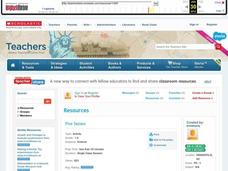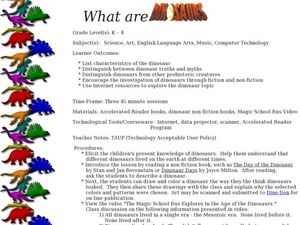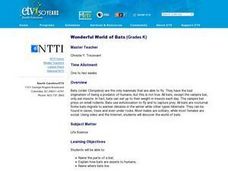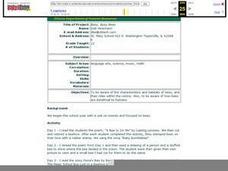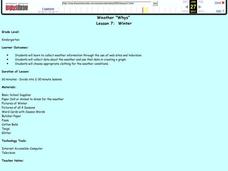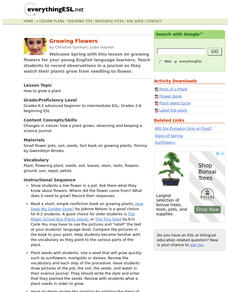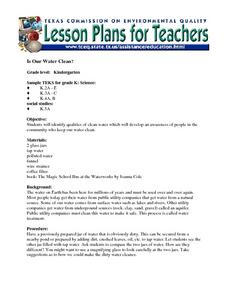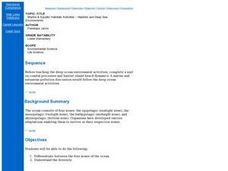Curated OER
BOTTOMS UP?
Students view a Magic School Bus video that teaches about the digestive system. They create a life-size model of the digestive system.
Curated OER
Is Our Water Clean?
Students identify qualities of clean water which will develop an awareness of people in the community who keep our water clean. This lesson has a literature tie-in with the "Magic School Bus" series.
Curated OER
Flower Power
An engaging, multi-session art and science lesson plan awaits your class. Within this lesson plan, you'll find everything you need to implement the plan. They go on a nature walk around their school, and must identify many living and...
Curated OER
Five Senses
Pupils explore the five senses. In this five senses science and literature lesson plan, students listen to The Magic School Bus Five Senses book, stopping to identify and discuss each sense. Pupils draw and label a picture of their...
Curated OER
"You Can't Catch Me!"-Introducing Young Children to the School Setting
Students use photography to create art projects.
Curated OER
Healthy Heart
Students discover the power of their heart and provide an opportunity to talk about ways to maintain good health. In this early childhood heart lesson, students diagram a human heart, identify exercises that promote a healthy heart, and...
Curated OER
A Honey of a Hexagon
Students explore how bees make honey and why the hexagon is the best basic pattern for the honeycomb through the use of a video and hands-on activities with honeycombs and geometric shapes.
Curated OER
To Rot or Not!
Students discover that composting helps reduce landfill waste and is good for the soil. They explore the techniques of composting through a variety of media, art activities and hands-on experience.
Curated OER
What are Dinosaurs?
Students explore the attributes of dinosaurs. In this dinosaur activity, students read books and watch videos featuring dinosaurs. Students also research dinosaur traits using Internet sources.
Curated OER
An Emerald Place
Students discover four layers of the rain forest and identify the life of animals at each level.
Curated OER
Here's the Pitch
Students define pitch, measure varying amounts of water into containers, make predictions about the sounds made when striking the containers, put containers in order from highest to lowest pitch, and create their own sound patterns with...
Curated OER
Wonderful World of Bats
Students create a book about bats. They write a letter to a scientist containing questions about bats. They compare the socialization of bats to humans; compare the needs of bats to humans and other animals.
Curated OER
Primary Lessons for Grades K-2
Students study wildlife and identify similarities and differences between their home and wild environments. In this wildlife lesson plan, students make connections between wildlife and wildlife habitats. Students then build knowledge...
Curated OER
What's in the Water?
Learners examine how pollutants can affect ocean animals. In this pollution lesson, students read a story about the ocean floor, think about what would happen to the plants and animals if the ocean became dirty or polluted, and conduct...
Curated OER
Ocean Life
Students explore the types of plants and animals that can be found in the ocean. They browse books and/or magazines to identify and gain a knowledge base of plant and animal life found in the ocean, then create a collage.
Curated OER
Hop To It!
Young scholars explore the aspects of a frog's anatomy that allow it to be such a good jumper and jump and record the length of each jump to determine which style of jumping allows them to jump the farthest.
Curated OER
Transportation
Students explore basic transportation vehicles, specifically air, land, and water vehicles, name six different modes of transportation, identify four different kinds of train cars, and three differences between two different modes of...
Curated OER
Busy, Busy Bees
Students role play bees finding nectar. they put on bee tails and antenna. Then 3 or 4 students at a time performed the dances bees do when one is communicating to the others that he has found nectar and the when they are close the...
Curated OER
Weather "Whys"
Students explore the weather. In this weather data lesson, students collect weather data from Internet and media sources. Students graph the collected data discuss it as well as the seasons of the year.
Curated OER
Growing Flowers
Learners grow flowers from seeds. They plant quick-growing seeds in a flower pot and consider what a seed needs to grow. They observe and record the growth of the planted seeds in science journals.
Curated OER
Finding Out About the Stars and Planets
Students complete a web-based activity to study the planets and solar system. Students complete a number of activities including a slide show that depict the true facts about planets.
Curated OER
We're Batty
Young scholars watch a video about bats and compare and contrast them to birds. They identify the specific characteristics that identify bats as mammals and what makes them unique from other mammals.
Curated OER
Is Our Water Clean?
Students identify qualities of clean water and develop an awareness of people in the community who keep our water clean.
Curated OER
Habitats and Deep Sea Environments
Students examine and identify the characteristics of the four zones of the ocean. They discover the amount of diversity in marine habitats. They also explore the adaptations organisms have that have allowed them to survive.
Other popular searches
- Magic School Bus Books
- The Magic School Bus
- Magic School Bus Lessons
- Magic School Bus Ocean
- Magic School Bus Technology
- Magic School Bus Wet All Over
- Magic School Bus Plays Ball
- Magic School Bus Lost in Space
- Magic School Bus Video
- Magic School Bus for Lunch
- Magic School Bus Gets Eaten
- Magic School Bus Ocean Floor





